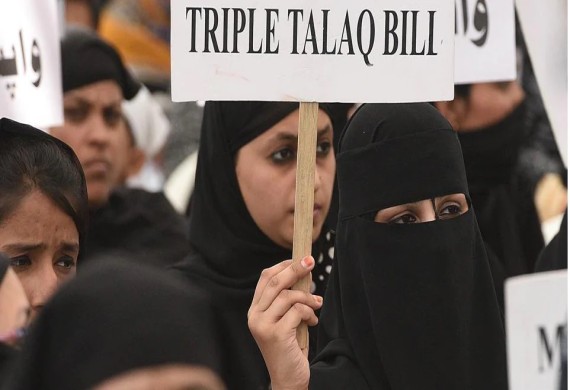
Triple Talaq Cases increases since passing of Muslim Women Act in 2019
By: WE Staff | Tuesday, 17 August 2021
Since the enactment of the Muslim Women (Protection of Rights on Marriage) Act in 2019, nearly 50 cases of triple talaq have been filed across the city's three police commissionerates, with 40 of them being registered within the Hyderabad police limits alone.
According to official records, most investigations are still ongoing, while in others, charge sheets have either been filed or are expected to be filed soon.
“The number of triple talaq cases in Hyderabad are still less. But it is quite possible that many victims are not coming forward due to social stigma and controversy around the Act,” a senior officer of Hyderabad police told.
Triple talaq, also known as instant divorce and talaq-e-mughallazah, was a type of Islamic divorce practised by Muslims in India, particularly those who followed the Hanafi Sunni Islamic schools of thought. It made it legal for any Muslim man to divorce his wife by saying the word talaq three times in oral, written, or, more recently, electronic form.
Among those who approached the police was Shabhana Begum (name changed). When she married Somali-born Abdi Wali Ahmed in 2015, she was promised a comfortable life in the United States, where the groom lived. Wadi, however, left for the United States alone just a few months after the wedding in Hyderabad. In December 2020, the 24-year-old lodged a complaint with the women's police station, distraught.
My husband was unavailable for an extended period of time. Then one day he called my father, asked him to put the phone on speaker (after confirming I was present), and said triple talaq,” Shabana explained.
Her case is still being investigated by police, and a chargesheet has yet to be filed. While local cops filed a chargesheet against accused Abdul Sami in another case registered with the LB Nagar police in July 2020, following a thorough investigation, the court has yet to take up the trial. “We have examined both the victim and the accused, and we have even gathered evidence to prove the crime,” said LB Nagar police.
But often, proving these cases is a tough task admit police officials. “That is because there is a possibility of witnesses turning hostile. The chances of scientific evidence in these cases is also less. If the accused is hiding abroad, it only complicates the matter further,” said an official dealing with these case.
Because of the length of the legal battles, victims' advocates say that many are hesitant to file an official complaint. Another reason cited is monetary constraints.
Most Viewed
- 1 Women's Health Startup HerMD Closing Doors Amid Industry Challenges
- 2 5 Famous Women in Indian Armed Forces
- 3 Saudi Women No longer Require Male Permission for Clothing Choices, says Prince MbS
- 4 Kolkata Medtech Startup Innovodigm Raises Rs 5.5 Crore Seed Funding Led by IAN Group
- 5 Yamunanagar's Kashish Kalra Honoured after Securing 111th Rank in UPSC Civil Services Exam
- 6 Madurai Appoints Its First Woman Corporation Head
- 7 IAS Vijayalakshmi Bidari Appointed as the new Nagpur Divisional Commissioner
- 8 American Entrepreneur Lucy Guo Overtakes T Swift to become Youngest Female Billionaire
- 9 ICC Women's World Cup 2025 Trophy Showcased at Indore's Holkar Stadium
- 10 Aparna Saxena's Beauty Venture AntiNorm Launches in India
- 11 Vidya Nataraj Co-Founded BlueStone Jewellery & Lifestyle files IPO
- 12 5 Women Freedom Fighters of India
- 13 Dr. G Krishnapriya appointed as CEO for Trichy
- 14 M3M & Sirona Partner to Introduce Menstrual Hygiene Vending Machines in 15 Locations
- 15 Punjab Govt launches SHE Cohort 3.0 Supporting Tech-led Women Startups
- 16 Indian origin Lawyer, Sweena Pannu appointed as the US New Superior Court Judge
- 17 The Aurora Tech Award recognizes 4 Indian Women-led Startups
- 18 Kerala's Republic Day parade featured an all-female tableau
- 19 Manisha Kabbur Becomes Karnataka's First Woman International Karate Coach
- 20 Director K. S. Ravikumar's Daughter Maalica Ravikumar Launches Life Coaching Company 'Evergrowth Academy' for Women
- 21 Leezu's Raises Pre-Seed Funding to Accelerate Growth in Sexual Wellness Industry
- 22 Sattu: Super-easy summer drink for PCOS gut healing
- 23 Swathi Nelabhatla creates Sitha App, India's First Women-Exclusive Gig Platform
- 24 7 Timeless Female Kathak Dancers & their Iconic Legacies
- 25 Meet 7 Iconic Women Architects of Modern India & their Most Impactful Work
- 26 This Woman-led Insuretech Startup is Helping Bridge the Education Financing Gap in India
- 27 Women Leaders Share Lessons Learnt from India Women's WC Win
- 28 5 Enterprising Women Founders Powering Singapore's Tech & Innovation Landscape
- 29 4 Women. 4 Stories. One Vision for Smarter, Stronger Healthcare
- 30 Global Gender Gap Narrows to 68.8%, But Full Equality 123 Years Away: WEF Report 2025
- 31 Changemakers: 7 Women Entrepreneurs Taking the Make in India Movement Forward
- 32 Meet Lucy Guo, The Youngest Self-Made Female Billionaire Disrupting Tech
- 33 How Women are Driving India's Festive Online Shopping Surge


.jpg)



